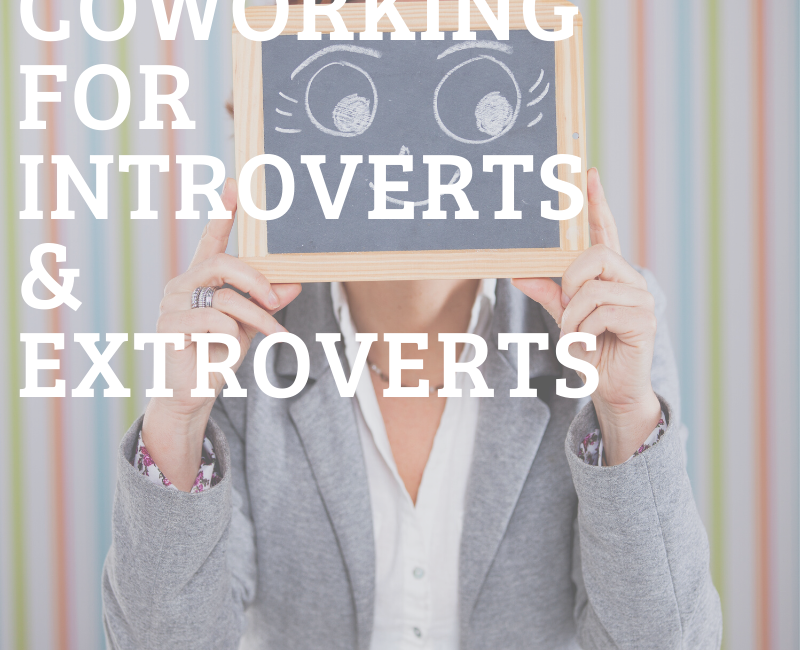First identified in the 1960s by psychologist Carl Jung, introverts and extroverts have a lengthy history of being the yin to the other’s yang. Jung observed that we distinguished the two extreme personalities types based on how they get and replenish energy. Introverts thrive and recharge under minimal stimulation and in solitude while extroverts gain energy from interacting with others and being in stimulating environments.
For the introvert or extrovert looking to leave their home office or local coffee shop to try co-working, here’s how each temperament fits within the flexible office scheme.
Which Personality Type Uses Co-Working Spaces Most?
According to a 2018 survey by Deskmag.com, the overall the percentages of coworking memberships shake out like this:
- 47% ambivert
- 30% extrovert
- 22% introvert
Introverts and Co-Working
It’s estimated that 25 to 40 percent of population is introverts. If you are an introvert, you know the stigma attached to it: you’re often accused of preferring self-isolation to vibrant human interaction. People also think you have nothing to say since you’re not as outspoken as your extroverted counterparts, but that couldn’t be further from the truth.
For co-working, here are the advantages of having an introvert in your midst and the benefits of being an introvert.
Introvert as a Co-Worker. Introverts tend to be warm, collaborative, and introspective. When co-working with an introvert, you’ll learn that they’re insightful, observant, and thrive in their inquisitive nature. For the extrovert in the co-working space, introverts can help bring balance to your business with their realistic take on everyday challenges.
The next time you have a problem you’re having difficulty solving, need an honest opinion on an idea, have a proposal you want read from the perspective of your prospect, or need input on a business decision, ask the introvert. You’ll get an answer that not only helps you find a proper conclusion, but you may even understand your prospects and clients better.
Co-Worker as an Introvert. Introverted people have an innate ability to hunker down and focus. Location and proximity don’t seem to matter as long as it’s undisturbed.
Introverts transitioning from a large corporate office or small business office to a co-working space can usually do so with ease. Dedicated desks and private offices work best for these workers. Introverts need to feel independent while working relaxed, comfortable, and without fear of disruption.
Co-working also exposes introverts to social events and networking. While introverts will show up at networking events, most prefer one-on-one conversation where they get to learn about other professionals’ businesses on a more intimate level.
Extroverts and Co-Working
We know extroverts for being lively, interested, curious, and friendly. They love discussing problems and talking through solutions with colleagues. Extroverts thrive socially and crave lots of human interaction. These social butterflies live for a bubbly environment.
Extrovert as Coworker. Unlike introverts, however, extroverted people can struggle when transitioning from an office environment to a co-working space. While extroverts are excited to venture off into entrepreneurship, they can find co-working isolating and can miss the company of having colleagues or being on teams.
Extroverted co-workers can be an enormous asset for the business of an introvert. As introverts are shy, extroverts pride themselves in being people persons and because of that, they can help you build and access relationships. In social settings, if paired with the extrovert, introverts can learn valuable interpersonal communications skills.
Co-Worker as Extrovert. Since extroverts love people, many are natural or nurtured leaders who seek or assume responsibility. Co-working spaces provide extroverts the opportunity to take ownership and help shape the culture of their workplace. Extroverts can be useful in planning events, being part of the welcome team, giving tours of the facility, and in co-working space management roles, if available.
Conclusion
In networking, both personality types bring qualities necessary to have a good, well-functioning co-working space. When each type of person can lean on the other for growing the weaker parts of their businesses—introspect in customer relations for the extrovert and networking and connecting for the introvert—the co-working space can be a thriving, balanced business community.

